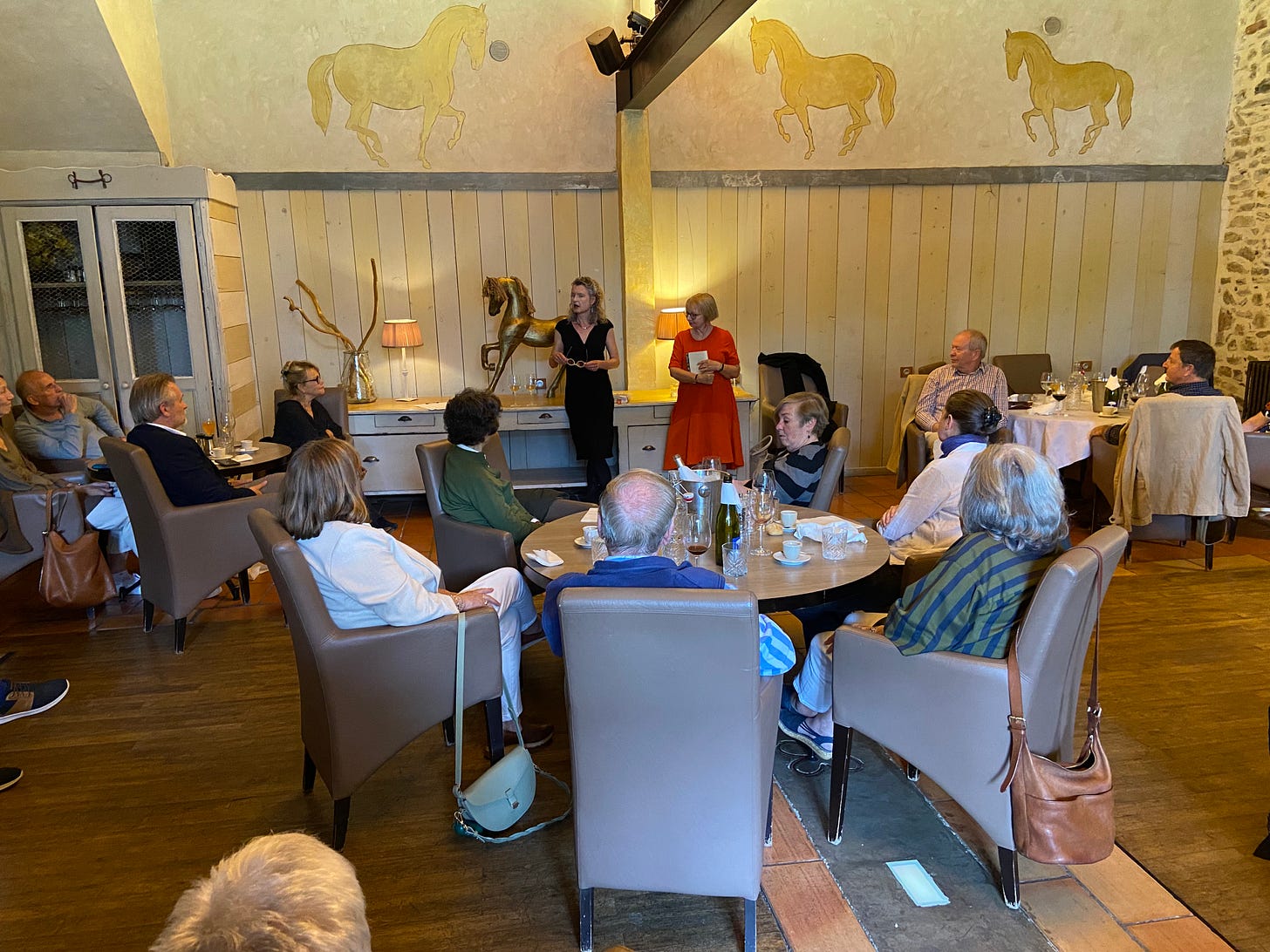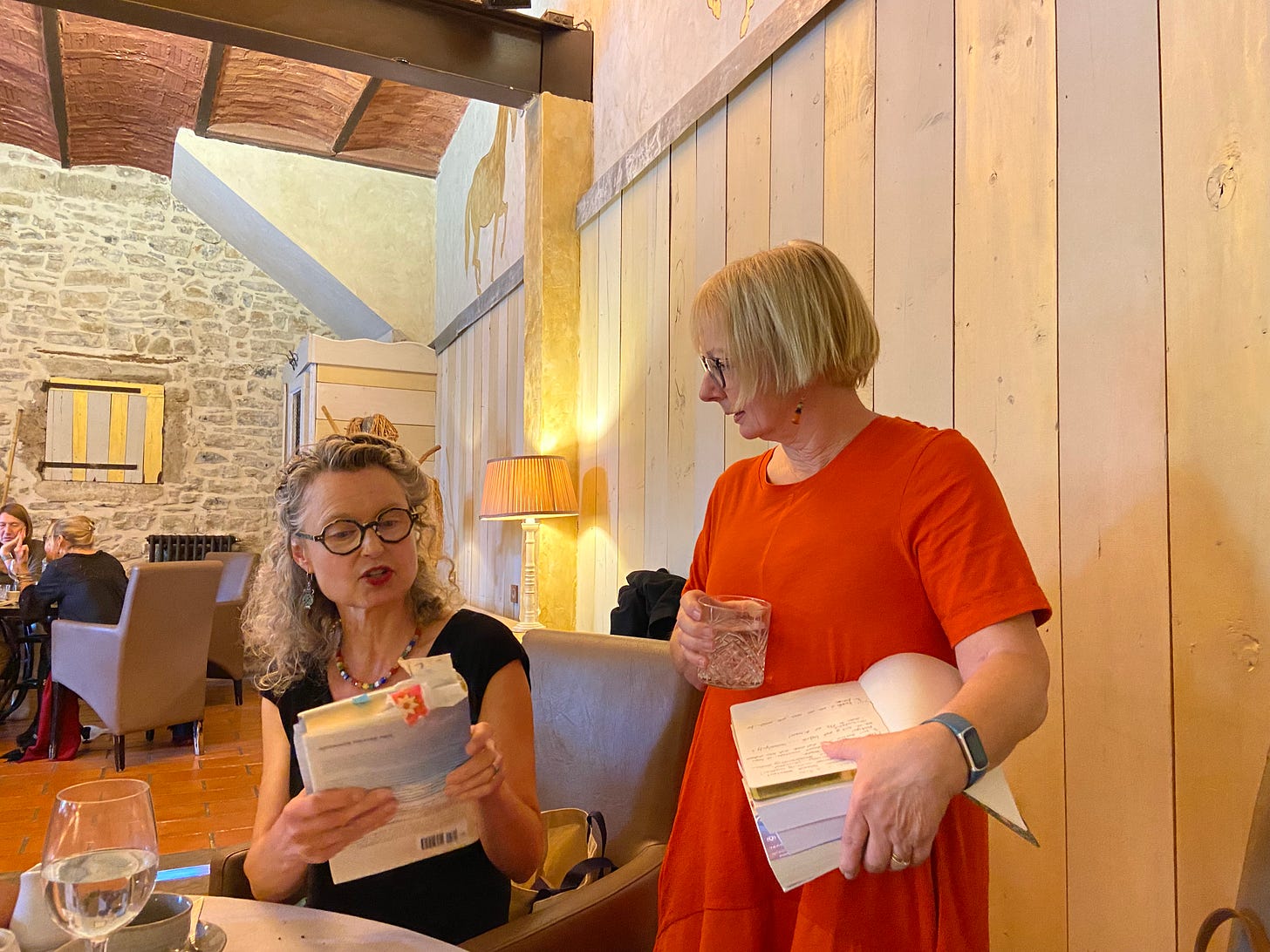My books are your books
During a time of medical setbacks, it revives me to connect with readers.
As I’ve written earlier, I recently began taking niraparib, a drug that is intended to prolong my life. It is a PARP inhibitor, meaning it interferes with the ability of cancer cells to repair their DNA.
Unfortunately, that is not all it interferes with. I have been so happy for the three weeks I have been taking this drug. Happy that I was finally on to this next stage of treatment. I always feel better when I am actively doing something to fight this cancer. Happy that my energy levels have returned to normal. Happy and relieved that I haven’t experienced any side effects. I am on the lowest dose possible, so that is not too surprising. But I had been anxious about the side effects, given how many boxes of drugs I was given to cope with all possible effets secondaires.
But my blood tests on Tuesday revealed that my platelets had dropped far below the level at which I can continue to take the drug. I didn’t get the results until the evening, at which point I couldn’t reach any of my doctors. I emailed them all. And I continued to take niraparib, not wanting to stop without talking with a doctor first. Yesterday was a holiday here in France, and though I rang every number at the hospital, no one was there. Most numbers went straight to voicemail. There was no use in calling the local emergency numbers, as only an oncologist would understand the drug and what I needed to do.
I was devastated by these blood test results, while also not surprised, knowing my sluggish bone marrow. This drug is my best chance for survival; I want to be able to tolerate it. But I am helpless against my platelets. There is nothing I can eat or do to make them rise.
All of my other bloods were down too. I’ve dipped back into anemia. I took a walk yesterday, feeling my low haemoglobin. It made me sad. I had such a glorious, brief period of bounding up mountains, and now I am back to struggling on the flats.
I am trying not to spiral in despair. This situation is not something I can control. I must just accept that my bone marrow is what it is, and that there is no point in longing for more industrious bone marrow. Yet I want my bloods to be resilient, just as I want to be resilient in all ways. It’s funny that I have written so much about resilience, especially in Exile Music. It has always interested me—how some people survive trauma and are able to not only go on, but go on to lead rich and meaningful lives. And some people cannot live with their trauma. I want to go on to lead a meaningful life for as long as I can.
This morning I received an email from my doctor. It began with “Vous devez arrêter le niraparib !” (You must stop the niraparib!) She used an extra large, bold font. I wish I had gotten this answer two days ago, before I took two more doses with my bloods already dangerously low. She continued the email to say that I now need blood tests twice a week, and that if I started to bleed from anywhere, I was to call this number.
So here I am, avoiding sharp objects and worrying about car accidents. Once again thrust back into limbo as I wait for my platelets to rise.
I have fortunately had much to distract me for the past couple of days. The Women’s League for Conservative Judaism in the United States invited me to speak about Exile Music with their book group. One of their members had read it for another book group and fallen in love with it. I love talking with book groups. It gives me the opportunity to engage with my readers, to hear their thoughts and experiences. More than fifty women attended my online talk and asked questions that made me think of the book in new ways.
The previous week I was invited to speak to the Association of American Women in Europe’s book group about The Ambassador’s Wife, a very different novel. It sparked invigorating conversations about the thorny ethical issues with which the book grapples. I enjoyed revisiting this novel—which I had to re-read before the event to make sure I remembered everything—and hearing the insights of readers.
Perhaps the most fun I had this week was doing an actual live event for the BritsNîmes Club, a regional organization offering a wide variety of activities, including hiking trips, artist visits, and literary luncheons. Yvette, the organizer of the luncheons, contacted me as soon as I joined the group. She had recognized my name, because back in 2015 or thereabouts, she had interviewed me for a radio program of the Emirates Airlines Festival of Literature in Dubai. Since then she has moved from Dubai to our part of France. I was amazed that she remembered me, and that we ended up living so close to each other.
The luncheon was held at a beautiful and sprawling stonewalled restaurant in Anduze, an ancient village alongside a river in the foothills of the Cevennes. In the 16th and 17th centuries, it was the headquarters of the Protestant forces in the South, who dreamed of an Huguenot state. Long before then, it was the cradle of French sericulture. We have moved from the Uzbek silk road to the silk centres of France.
Standing at the front of the room with Yvette, answering her questions about my life and work, I felt like myself again. My cancer patient persona fell away; I was an author telling stories. I read a brief section from the Overture of the book. I talked about the origins of Exile Music and the way it explores music as a way to find a way through trauma. I answered questions about my kidnapping and talked about the suicide bombing attack on Tim. I talked about my reporters in Yemen, my writing habits, and how my writing has changed with each book.
Afterwards, a few people asked me to sign their books. Others came to ask questions or share their own experiences. One woman came to tell me that Exile Music had left her in tears. She had Jewish grandparents in Europe. She grew up in Kenya. She had so much more to tell me that I wanted to hear, so we agreed to meet soon to talk.
I had arrived at the event exhausted and dispirited, and I left at the end of the afternoon infused with new energy and belief in myself. I felt overwhelmed with gratitude for all of the people who came—the event was sold out.
Now I return to my desk to forge on with a novel, essays, stories. The real work. But in my solitary days here, it helps to know that there are people out there in the world eager to read my pages.
Once a book leaves my hands, it is no longer my book. It belongs to its readers, each of whom will relate to it in their own way. I can’t control how people think about the book, and this is a wonderful thing. This is why I am always so interested in hearing what readers find memorable or meaningful or upsetting.
In The Ambassador’s Wife, one character’s fate is implied rather than made explicit. I expected readers to understand that she was dead. But one reader who came to an event told me how relieved she was that the character survived in the end. I could not disillusion her. If she wanted to believe that the character lived, who was I to take that away from her? In fact it makes me happy to know that for someone somewhere, this character endures.
If any of you are interested in having me speak with your organization or book group, either in person or online, please contact me at jfsteil@gmail.com.







Love reading you and also love the region of France where you live! I think I will reread THE AMBASSADOR’’S WIFE. It would make such a good movie!
Jennifer, you have so much love in you and you are so loved back. Thank you for sharing your ordeal. I am sure , like. me, every reader here is hoping and praying and sending good thoughts so that you can get better and get strong. We are rowing with you on this journey. I am with the AAWE group who read the Ambassador’s Wife so I feel as though I know you a little. Hang in there for miracles do happen !